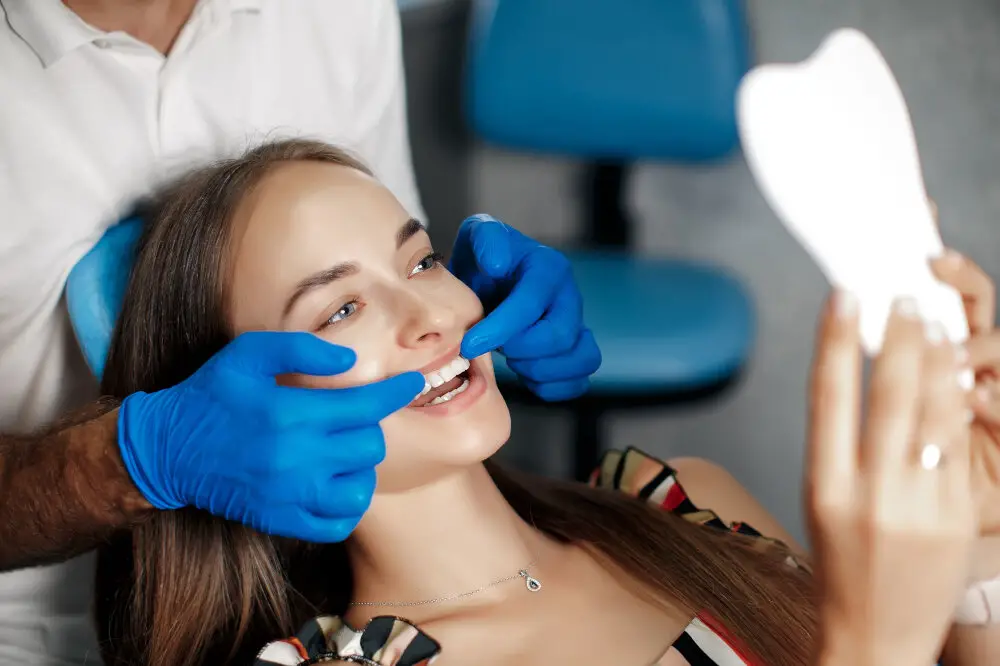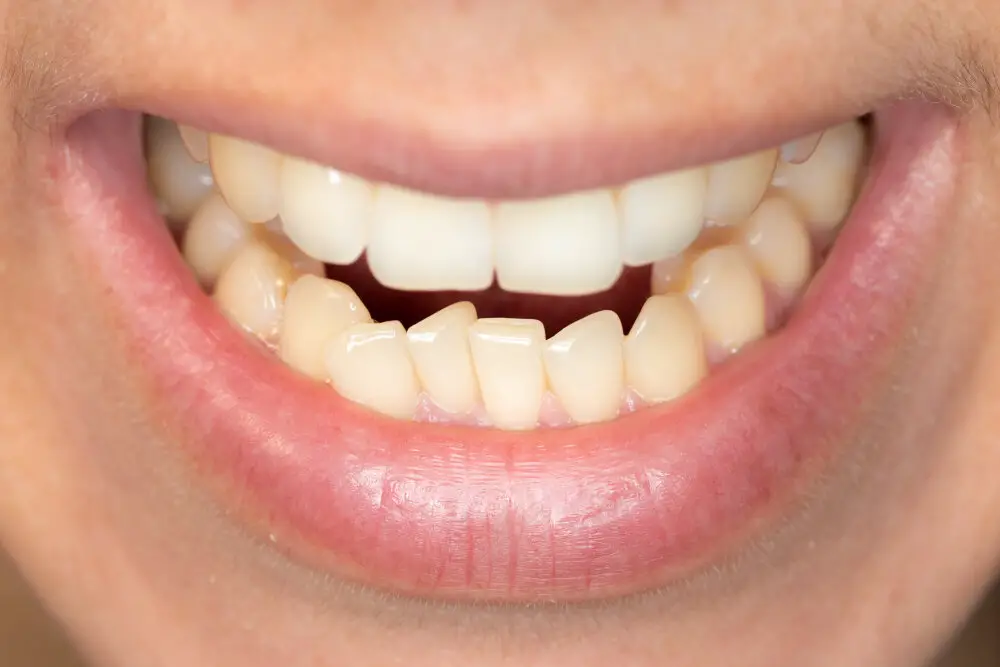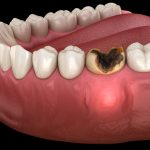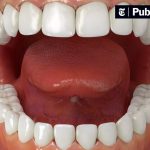Why Do My Teeth Keep Chipping? Common Causes and Prevention Tips

The teeth are one of the most important parts of our body, and they play a crucial role in our daily lives. They help us chew our food, speak clearly, and even enhance our physical appearance. However, despite their strength and durability, teeth can still chip or break due to various reasons. Chipped teeth can be painful, unsightly, and can also lead to more severe dental problems if left untreated. Therefore, it is essential to understand the common causes of chipping teeth and how to prevent them. Chipping teeth is a common dental problem that affects people of all ages. Some of the common causes of chipping teeth include trauma to the mouth, biting on hard foods or objects, teeth grinding, poor oral hygiene, and cavities. In some cases, chipped teeth can occur due to genetics or age-related wear and tear. Regardless of the cause, it is crucial to take preventive measures to avoid chipping teeth and protect your dental health. In this article, we will discuss the common causes of chipping teeth and provide tips on how to prevent them.
Chipped teeth, also known as fractured teeth, occur when a part of the tooth breaks off or becomes damaged due to trauma, injury, or wear and tear. This can range from minor chips on the tooth’s surface to more severe fractures that expose the tooth’s pulp and nerves. Common causes of chipped teeth include biting down on hard objects, grinding teeth, and injuries to the face or mouth. Other factors that increase the risk of chipping teeth include poor dental hygiene, aging, and certain medical conditions. To prevent chipped teeth, it is essential to maintain good oral hygiene, wear mouthguards during physical activities, avoid chewing on hard objects, and visit a dentist regularly for checkups and preventive care.
Maintaining dental health is crucial for overall well-being. Neglecting oral hygiene can result in a range of issues, from tooth decay to gum disease, and even tooth loss. Poor dental health can also lead to more severe health problems such as heart disease, stroke, and diabetes. Regular brushing, flossing, and dental check-ups can prevent these issues and ensure that teeth remain healthy and strong. Additionally, avoiding harmful habits such as biting nails or chewing on ice can prevent teeth from chipping or breaking. By taking care of dental health, individuals can not only maintain a beautiful smile but also safeguard their overall health.
Causes of chipped teeth

Chipped teeth are a common dental problem that many people experience. There are several causes of chipped teeth, including accidents, trauma, and biting on hard foods. Accidents, such as falls or sports injuries, can cause chipped teeth if the impact is strong enough. Trauma to the mouth or face can also cause chipped teeth, such as getting hit in the face with an object. One of the most common causes of chipped teeth is biting on hard foods, such as ice or hard candy. This can cause small chips or cracks in the teeth over time, which can eventually lead to larger chips or breaks. Other causes of chipped teeth include tooth decay, grinding or clenching the teeth, and using the teeth as tools. Preventing chipped teeth is important for maintaining good dental health. Some tips for preventing chipped teeth include wearing a mouthguard during sports activities, avoiding hard or crunchy foods, and using scissors or other tools instead of the teeth to open packages or containers. Regular dental check-ups can also help detect any signs of tooth decay or damage, allowing for prompt treatment before a chip occurs. In some cases, dental bonding or crowns may be recommended to repair chipped teeth and prevent further damage. By taking steps to prevent chipped teeth and seeking prompt dental care when needed, individuals can maintain healthy teeth and a beautiful smile.
Biting or chewing on hard foods or objects is one of the most common causes of chipped teeth. When you apply excessive pressure on your teeth by biting down on hard objects like ice, hard candy, or even pencils, it can cause tiny cracks in the enamel that can eventually lead to larger chips. Similarly, using your teeth as tools to open packages or bottles can also cause chips or fractures. To prevent chipped teeth, it’s important to be mindful of what you’re biting or chewing on and to avoid using your teeth as makeshift tools. If you have a habit of chewing on hard objects, consider finding alternative ways to satisfy that urge, such as chewing gum or using stress balls.
Trauma or accidents are common causes of chipped teeth and can occur unexpectedly. A fall, a sports injury, or a car accident can all lead to a damaged tooth. Trauma can also occur from biting down on hard objects like ice or nuts. In some cases, the force of a traumatic event can even cause a tooth to be knocked out entirely. It’s important to seek immediate dental care if you experience trauma to your teeth, as the longer you wait, the higher the risk of further damage or infection. Wearing protective gear during sports or other high-risk activities can also help prevent dental trauma and chipped teeth.
Teeth grinding or clenching, also known as bruxism, is a common condition that affects many people of all ages. This habit involves the involuntary grinding or clenching of the teeth during the day or night, and can result in a variety of dental problems, including chipped or cracked teeth, worn down enamel, and jaw pain. There are several causes of bruxism, including stress, anxiety, certain medications, and sleep disorders, and it is important to address these underlying issues to prevent further damage to the teeth and gums. Prevention methods include wearing a mouthguard at night, practicing stress-reducing techniques, and avoiding caffeine and alcohol.
Tooth decay, also called cavities, is a common dental problem that occurs when bacteria in the mouth produce acid that erodes the enamel of the teeth. This erosion creates tiny holes or pits in the teeth, which can lead to pain, sensitivity, and even tooth loss if left untreated. Factors that can contribute to tooth decay include poor oral hygiene, a diet high in sugar and carbohydrates, dry mouth, and certain medications. To prevent tooth decay, it is important to brush and floss regularly, limit sugary and acidic foods and drinks, use fluoride toothpaste and mouthwash, and visit the dentist for regular cleanings and checkups.
Age-related wear and tear is a common cause of chipping teeth. As we age, our teeth become more brittle and can crack or chip more easily. This is due to the natural wear and tear that occurs over time, as well as the fact that our teeth are exposed to more stress and pressure as we get older. Additionally, lifestyle factors such as diet, smoking, and poor oral hygiene can exacerbate age-related wear and tear, making it more likely that your teeth will chip or crack. To prevent chipping due to age-related wear and tear, it is important to practice good oral hygiene, avoid hard foods and candies, and see your dentist regularly for check-ups and cleanings.
Symptoms of chipped teeth

Chipped teeth can be a source of discomfort, pain, and embarrassment. If you have a chipped tooth, you may experience a range of symptoms, including sensitivity to hot or cold temperatures, pain when biting or chewing, sharp or rough edges on the affected tooth, and swelling or inflammation of the surrounding gums. In some cases, a chipped tooth may also cause bleeding, especially if the chip is deep enough to expose the underlying nerves and blood vessels. If you notice any of these symptoms, it’s important to seek treatment as soon as possible to prevent further damage and ensure your overall oral health. In addition to the physical symptoms, chipped teeth can also have a significant impact on your self-confidence and social interactions. You may feel self-conscious about your smile or avoid certain foods or activities to avoid further damage to your teeth. Over time, untreated chipped teeth can also lead to more serious dental problems, such as decay, infection, or tooth loss. That’s why it’s important to address the issue early on and work with your dentist to develop a personalized treatment plan that meets your needs and goals. With the right care, you can restore your smile and regain your confidence, while also protecting your long-term dental health.
Visible cracks or chips in the teeth can be a cause of concern for many individuals. These chips and cracks can occur due to several reasons, such as trauma, grinding, or biting hard objects. They can also be a sign of underlying dental issues, such as tooth decay or weakened enamel. If left untreated, these cracks and chips can not only affect the appearance of your teeth but also lead to further damage and sensitivity. Therefore, it is important to seek dental care as soon as possible to repair any visible chips or cracks and address any underlying dental issues to prevent further damage. Additionally, preventive measures such as wearing a mouthguard during sports or avoiding biting hard objects can help maintain the integrity of your teeth.
Tooth sensitivity or pain is a common dental problem that affects millions of people worldwide. It occurs when the dentin layer of the tooth is exposed, which can be caused by a variety of factors, including tooth decay, gum recession, and dental procedures. The pain can range from mild discomfort to severe, sharp pain, and can be triggered by hot or cold foods and drinks, sweet or acidic foods, and even brushing or flossing. To prevent tooth sensitivity or pain, it is important to practice good oral hygiene, avoid acidic and sugary foods and drinks, and wear a mouthguard if you grind your teeth at night. If you experience persistent tooth sensitivity or pain, it is important to consult a dentist to determine the underlying cause and receive appropriate treatment.
Difficulty eating or drinking can be a frustrating and painful experience that can significantly impact your quality of life. Some common causes of this issue include tooth decay, gum disease, or misaligned teeth, which can make it difficult to properly chew and swallow food. Additionally, certain dental procedures, such as fillings or crowns, can cause temporary sensitivity or discomfort while eating or drinking. To prevent this issue, it is important to maintain good oral hygiene habits and visit your dentist regularly for cleanings and checkups. Your dentist can also recommend treatments such as braces or dental implants to help improve your ability to eat and drink comfortably.
Tongue or cheek irritation can be a common symptom of teeth chipping. When a tooth chips, it can create rough or jagged edges that rub against the soft tissues in the mouth, causing discomfort and irritation. Additionally, if the chip is sharp enough, it can even cut the tongue or cheek. To prevent this irritation, it’s important to have any chips in your teeth repaired promptly by a dentist. In the meantime, you can try using dental wax or a mouthguard to protect your tongue and cheeks from further irritation. It’s also important to practice good oral hygiene to prevent further chipping and damage to your teeth.
Prevention tips for chipped teeth

Chipped teeth are a common dental issue that can lead to discomfort, pain, and even infection. Fortunately, there are several prevention tips that can help you avoid chipped teeth and maintain optimal oral health. One of the most important prevention tips is to avoid biting down on hard objects such as ice, hard candy, or pens. Doing so can lead to chips and cracks in your teeth, which can be painful and require costly dental treatments. Additionally, you should avoid using your teeth as tools to open packages or bottles, which can also lead to chipping. Another important prevention tip for chipped teeth is to wear a mouthguard if you play sports or grind your teeth at night. Mouthguards can help protect your teeth from impact during sports and cushion the grinding forces of bruxism, which can lead to chips and cracks over time. Additionally, you can prevent chipped teeth by maintaining good oral hygiene habits such as brushing twice a day, flossing daily, and visiting your dentist regularly for cleanings and checkups. By following these prevention tips and taking good care of your teeth, you can reduce your risk of chipped teeth and maintain a healthy, beautiful smile for years to come.
Avoiding hard foods or objects is one of the essential tips for preventing chipped teeth. Hard foods like popcorn kernels, ice, and hard candy, can cause significant damage to your teeth, especially if consumed frequently or in large quantities. Additionally, using your teeth to open packages, bite on pens or pencils, or chewing on non-food items like fingernails can also lead to chipping. Therefore, it is crucial to be careful while eating and avoid using your teeth as tools to prevent any damage to your teeth. If you have a habit of grinding your teeth, using a mouthguard can also help protect your teeth from chipping. By following these simple tips, you can prevent chipping and keep your teeth healthy and strong.
Wearing a mouthguard during sports is an essential preventive measure to protect your teeth from chipping. Mouthguards act as a cushion to absorb the impact of any sudden blow or trauma to the face, reducing the risk of dental injuries. They also provide a barrier between the upper and lower teeth, preventing them from grinding against each other, which can cause wear and tear and lead to chips and cracks. By investing in a high-quality mouthguard, you can safeguard your teeth and avoid the discomfort and expense of repairing or replacing damaged teeth. Remember, prevention is always better than cure, so don’t take any chances with your dental health when it comes to sports.
If you’re experiencing chipped teeth due to clenching or grinding, it’s important to consult with a dentist. Your dentist can examine your teeth and determine the severity of the damage. They may recommend a nightguard, which is a custom-made mouthguard that fits over your teeth while you sleep. This can help reduce the pressure on your teeth and prevent further damage. Additionally, your dentist may suggest other treatments such as orthodontics or dental restorations to restore your teeth to their original shape and function. Addressing this issue with a dentist can not only prevent further damage to your teeth, but it can also improve your overall dental health and quality of life.
Maintaining good oral hygiene is crucial for preventing teeth chipping. Brushing twice a day with fluoride toothpaste, flossing daily, and using mouthwash can help remove plaque and bacterial buildup that weakens tooth enamel. Regular dental checkups every six months can also help detect any dental issues early on before they progress into more severe problems, including tooth decay, gum disease, and chipping. Moreover, dentists can provide professional teeth cleaning, dental fillings, and dental bonding to strengthen and repair teeth and prevent further damage. In addition, eating a balanced diet and avoiding hard foods, ice, and harmful habits such as teeth grinding and nail biting can also help maintain healthy teeth and prevent chipping.
Dental procedures like bonding or veneers are effective solutions for chipped teeth. Bonding involves applying a tooth-colored resin to the surface of the tooth and sculpting it to restore its shape. Veneers, on the other hand, are thin layers of porcelain or composite material that are custom-made to fit over the front of the tooth. Both bonding and veneers can provide a natural-looking, long-lasting solution to chipped teeth. However, it’s important to note that these procedures may not be suitable for all types of chips or damage, and consulting a dentist is crucial for determining the best course of action.
Treatment options for chipped teeth

One of the most common dental issues is chipped teeth, and it can be caused by several factors such as trauma, poor oral hygiene, teeth grinding, and biting hard objects. Fortunately, there are several treatment options available to address this problem. The most common solution is dental bonding, which involves applying a tooth-colored resin to the chipped area and using a special light to harden it. This treatment is quick, painless, and affordable, making it an excellent option for minor chips. However, it may not be suitable for large or deep chips. Another treatment option for chipped teeth is dental veneers. These are thin, custom-made shells that are attached to the front surface of the teeth to improve their appearance. They are an excellent option for chips that are too large for bonding or that affect the front teeth’ appearance. The process involves removing a small layer of the tooth enamel to make room for the veneers, which are then bonded to the teeth using dental cement. This treatment is more expensive than bonding but provides a longer-lasting and more natural-looking solution. In severe cases where the tooth is severely damaged or fractured, a dental crown may be necessary to restore the tooth’s strength and function.
Dental bonding is a cosmetic procedure used to repair chipped or cracked teeth. It involves applying a tooth-colored resin material to the damaged area and then hardening it with a special light. Bonding can also be used to close gaps between teeth, change the shape of teeth, or cover up stains. The procedure is relatively quick and painless, and can often be completed in just one visit to the dentist. However, bonding is not as durable as other restorative options such as crowns or veneers, and may need to be repaired or replaced over time. It is important to practice good oral hygiene and avoid habits that can damage teeth, such as biting on hard objects or using teeth as tools, to help prevent the need for dental bonding in the first place.
Dental crowns, also known as caps, are custom-made coverings that are placed over damaged or decayed teeth to restore their size, shape, and function. They can also be used to improve the appearance of teeth by correcting their color or alignment. Crowns are typically made from various materials, including porcelain, ceramic, or metal alloys, and are designed to be durable and long-lasting. They are a common treatment option for teeth that have been severely chipped or damaged by decay or trauma, and can help prevent further damage and decay from occurring. Proper oral hygiene and regular dental check-ups can help extend the life of dental crowns and ensure optimal oral health.
Veneers are a popular cosmetic dental treatment used to improve the appearance of chipped or stained teeth. They are thin shells made of porcelain or composite resin that are custom-made to fit over the front surface of the teeth. Veneers are an effective solution to repair chipped teeth or to improve the appearance of teeth that are too small, misshapen, or discolored. The process of getting veneers involves removing a small amount of the tooth’s enamel to make room for the veneer. Once the veneer is bonded to the tooth, it can last for many years with proper care. While veneers can provide a long-lasting solution for chipped teeth, it’s important to address the underlying cause of the chipping to prevent further damage.
Root canal and crown placement are common dental procedures used to repair damaged or decaying teeth. A root canal is typically performed when the pulp inside a tooth becomes infected or inflamed, resulting in intense pain and sensitivity. During the procedure, the dentist removes the damaged pulp and fills the cavity with a special material to prevent further infection. A crown is often placed over the tooth after a root canal to provide additional support and protect the tooth from further damage. Crowns are also used to cover chipped or cracked teeth, improving the appearance and function of the affected tooth. While these procedures may seem intimidating, they can greatly improve the health and appearance of damaged teeth, allowing patients to smile and eat with confidence.
Tooth extraction is a dental procedure performed in severe cases when a tooth is beyond repair. This is an invasive procedure where the dentist will numb the affected area, remove the tooth from its socket, and stitch the gum to promote healing. Tooth extraction may be necessary due to severe decay, gum disease, trauma, or overcrowding. Although it may seem daunting, tooth extraction is a common procedure with minimal discomfort and can prevent further damage to surrounding teeth and gums. It’s important to follow post-operative instructions provided by your dentist to ensure a successful recovery.
Chipped teeth are a common dental issue that can occur due to various causes such as grinding, biting on hard objects, tooth decay, or physical trauma. The symptoms of chipped teeth may include pain, sensitivity, or rough edges on the tooth surface. To prevent chipped teeth, it’s important to avoid chewing on hard objects such as ice or pens, wear a mouthguard during sports activities, and maintain good oral hygiene. Treatment options for chipped teeth depend on the severity of the damage and may range from bonding or veneers to crowns or even tooth extraction in extreme cases. Early intervention is crucial in preventing further damage and restoring the tooth’s function and appearance.
Maintaining good dental health is crucial to prevent chipped teeth. A healthy and balanced diet, regular brushing, and flossing are the most effective ways to maintain good oral hygiene. Avoiding hard foods, chewing ice, and using teeth as tools can also prevent teeth from chipping. Additionally, wearing a mouthguard during sports activities can protect teeth from trauma. It is also important to visit the dentist regularly for check-ups and cleanings, as they can identify and treat any dental issues before they become severe. Overall, taking care of your dental health can help prevent chipped teeth and keep your smile bright and healthy.
Conclusion

In conclusion, chipped teeth can be caused by a variety of factors such as teeth grinding, poor dental hygiene, and consuming hard foods or objects. It is essential to maintain good oral hygiene habits, such as brushing and flossing regularly, as well as scheduling routine dental checkups to prevent further damage. Additionally, wearing a mouthguard during physical activities or at night to prevent teeth grinding can also help protect the teeth from chipping. By taking the necessary precautions and seeking dental treatment if necessary, individuals can prevent chipped teeth and maintain a healthy, beautiful smile.







